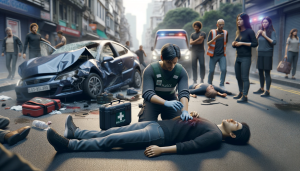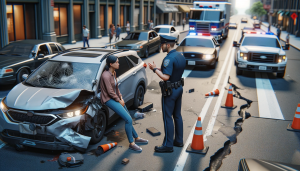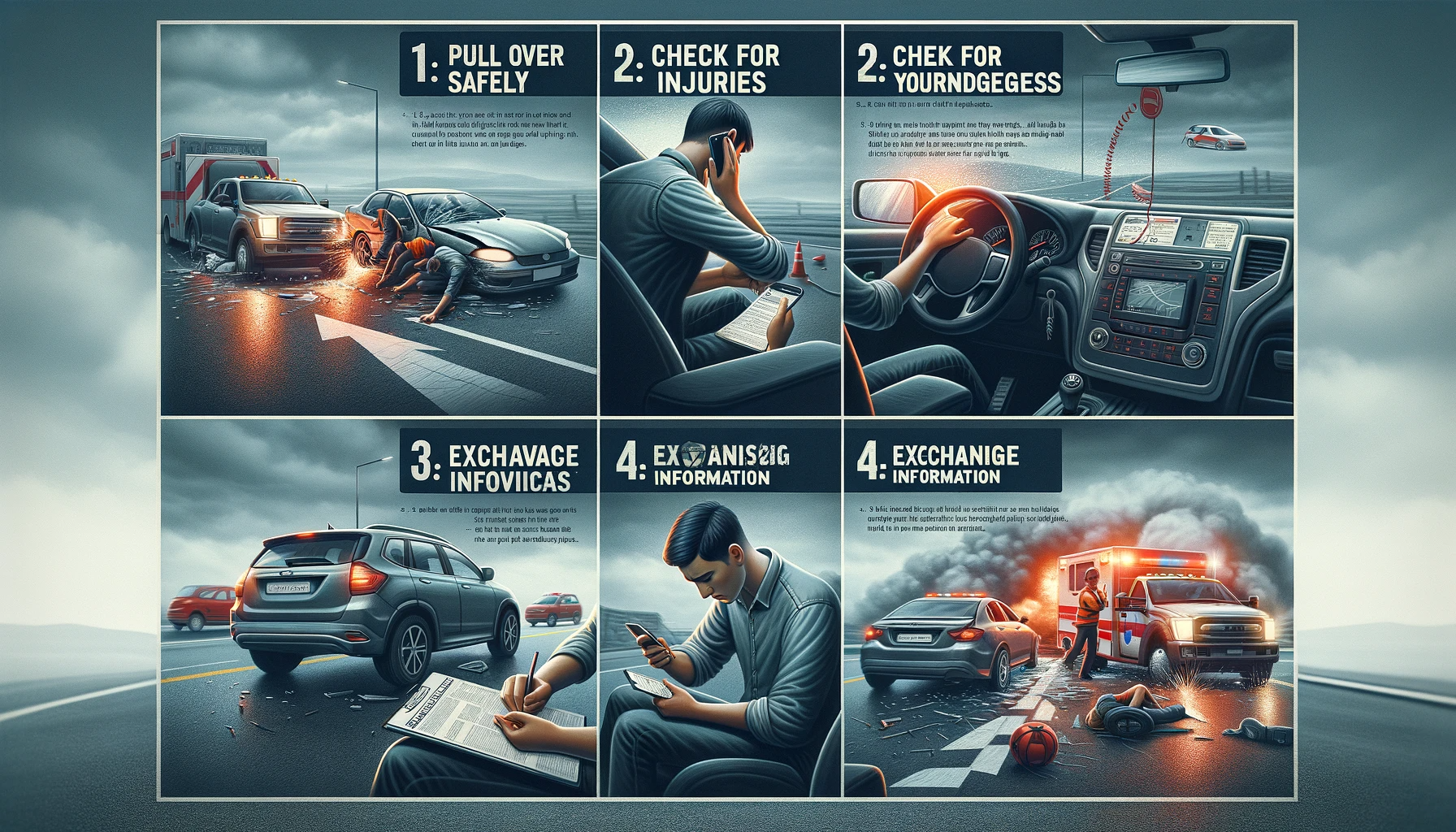Understanding the Importance of First Response
The Crucial Role of First Responders
First responders are the frontline guardians in accident scenarios. These trained professionals, who may be paramedics, firefighters, or police officers, promptly arrive on scene to control the situation and minimize damage. Their expertise, coupled with their capacity to make quick decisions, are instrumental in saving lives and reducing the severity of injuries.

Immediate Medical Attention
First response also encompasses immediate medical attention given at the scene. By evaluating victims' conditions and administering initial treatment, first responders stave off life-threatening circumstances until victims can be transported to a hospital. This swift medical response can often mean the difference between life or death.
Preservation of Evidence
In the context of legal proceedings that may follow an accident, first responders play a pivotal role in preserving the scene and collecting evidence. The first response team documents and maintains the integrity of the scene, assisting in legal investigations and helping to determine fault or liability when necessary.
Psychological Aid Throughout Crisis
The importance of psychological aid provided by first responders during crises cannot be overstated. Victims of accidents often experience a barrage of emotions ranging from fear and anxiety to shock and denial. First responders are trained in crisis counseling techniques, offering immediate emotional support to victims, reassurance, and guidance on the next steps, thus helping to mitigate trauma.
Promoting Public Safety
By securing the scene and managing traffic, first responders help ensure public safety following an accident. This prevention role helps avoid additional accidents or incidents caused by uncontrolled environments. Understanding how these responsibilities contribute to the larger objective of collective safety can help us appreciate the importance of the first response even more.
Assessing the Situation Quickly and Calmly
Initial Reaction to an Accident
In the immediate aftermath of an accident, it's crucial to remain as level-headed as possible. Your first feelings might be shock or panic, but try to take deep breaths and calm yourself down. This is because clear thinking is your best tool in such scenarios and would allow you to make rational choices that could help reduce the severity of the situation.
:Identifying Potential Dangers
Once you've regained a certain level of composure, observe your surroundings for any imminent threats. These could include fires, potentially explosive materials, or other hazardous conditions that can worsen the situation or pose further harm to those involved. Being aware of these potential dangers will enable you to inform emergency responders more accurately about the situation at hand when they arrive on site.
Assessing Injuries and Damages
The next step is to check on all parties involved in the accident. Carefully yet quickly evaluate the extent of injuries and damages sustained in the accident. If it’s safe to do so, provide appropriate first aid to those injured while waiting for the medical team to arrive. Keep in mind not to move someone who seems seriously injured, unless their current position is dangerous.
Gathering Information
After everyone's immediate safety has been ensured, gather as much information as you can. Take note of the accident details such as the time, location, and circumstances leading up to it. Document the scene with pictures if possible. This will serve as vital data when reporting the incident to law enforcement or insurance companies.
Contacting the Authorities
Finally, report the accident to the appropriate authorities as soon as possible. It's important to have the emergency services involved right away, especially if there are severe injuries or significant property damage. Provide them with your gathered information and follow their instructions carefully. The accurate assessment of the situation will be a huge asset to them when arriving on scene.
Ensuring Personal Safety Before Helping Others
Check Your Surroundings
Before you rush to help others in an accident, it’s critical to first assess your surroundings. Look out for any potential hazards, such as leaking fuel, fallen power lines, or upcoming traffic that could put you at risk. Depending on the situation, it might be necessary to move to a safer location before you can extend assistance.
Protecting Yourself
Make sure you are physically equipped to provide assistance without endangerging your wellbeing. Wearing protective gear (if available), such as gloves, can prevent exposure to bloodborne pathogens. If the incident involves chemicals or fire, ensure you have the appropriate safety equipment before attempting to help.
Evaluating Your Physical and Emotional State
In high-stress situations, your adrenaline levels can spike, potentially masking signs of personal injury or emotional distress. It's important to ascertain whether you're physically and emotionally capable of providing help. If you aren't feeling well, step back and let others take over.
Adhering to Safety Procedures
Every accident scenario has established safety procedures designed to minimize further injury or harm, and these should be strictly adhered to no matter what. This might involve stabilizing a car after a crash, neutralizing a hazardous spill, or maintaining a safe distance from an unstable structure.
Calling Professional Help
Even if you're able to provide immediate assistance, always contact professional emergency services as soon as possible. Professionals are trained to handle accidents and emergencies, and they have the necessary equipment and skills to ensure personal safety while helping others.
How to Effectively Call for Help
Recognize the Seriousness of the Situation
First, it is critical to accurately assess the severity of the accident. This may vary from minor incidents to emergencies threatening life or property. Understanding the gravity potentially saves valuable time and helps in fostering clarity when communicating with the emergency services.
Communicating the Right Information
Once you have dialed emergency services, give them clear information on your location and the nature of the accident. Be precise about street names, landmarks, and the number of people involved. Do not forget to mention specific injuries or any dangerous situation like a fire or a potential gas leak. This detail could be crucial for first responders to prepare adequately before they arrive at the scene.
Stay Composed While Calling for Help
Keeping your cool during such high-stress situations can understandably be challenging, but it's paramount to effective communication. Take a deep breath before you make the call and try to speak as clearly and calmly as possible. This helps the operator understand you better and provides more accurate assistance swiftly.
Follow The Instructions
Typically, the emergency service operators are trained to provide vital first aid instructions over the phone. Listen carefully and follow them to the letter. Remember, these measures are temporary until professional help arrives, so do not hang up until you are advised to do so.
Calling for Help When Phone Isn't an Option
In some scenarios, making a phone call might not be possible. In such cases, consider other methods of communication. Modern technologies like Emergency SOS on smartphones, safety apps, or even car crash detection systems can send automated emergency messages. If you're unable to use these, try to attract the attention of people around you by shouting or waving for assistance.
Administering Basic First Aid If Necessary
Understanding The Basics of First Aid
First aid is immediate care given to an injured or ill person before professional medical help arrives. It's essential you stay calm and collected while performing first aid. Time is crucial in these situations, and a clear head can save lives. Make sure to protect yourself, too; wear personal protective equipment if available.
Checking the Person's Condition
Before administering first aid, assess the victim's condition. Safety first: ensure your surroundings are secure from potential hazards. If possible, try asking the individual about their symptoms. If they're unconscious, check for responsiveness by tapping them lightly or shouting. Always handle with care to avoid causing further injury.
Providing Basic Care
Depending on the person's condition, different actions may be necessary. For breathing difficulties, establish an open airway - tilt the head back, lift the chin, and check their breathing. If necessary, begin chest compressions combined with rescue breaths (CPR).
For bleeding injuries, clean the wound if you can, then apply steady pressure with a bandage or cloth and elevate the injury above heart level, if possible. Don't remove any embedded objects as it could lead to worse bleeding.
Handling Specific Injuries
Special care must be taken depending on the nature of the injury. For burns, cool the area under running water for at least 10 minutes before covering with a clean, non-sticky dressing. If a bone appears broken, keep the area immobile, using items like cardboard, magazines or clothing as makeshift splints.
Seeking Professional Help
Finally, always remember that first aid is just that - the first response. Even after administering first aid, it's crucial to seek professional medical help. Use local emergency numbers to contact help and provide them with accurate information about what happened and what first aid has been given.
Cooperating with Emergency Services Upon Arrival
Initial Interaction with First Responders
When emergency services arrive at the scene of an accident, it's crucial to cooperate fully with them. They are there to secure the area and ensure everyone's safety. Make way for their vehicles. If you're not injured, follow their instructions promptly and accurately. They may ask you to move to a particular place or stay where you are.
Providing Accurate Information
Emergency responders will need a precise account of what happened. Share your side of the story truthfully and clearly. Be prepared to answer questions about the nature and extent of any injuries. Your honesty is crucial in helping the authorities understand the situation and provide necessary help.
Assisting in Medical Aid
In case of injuries, professional medical personnel are responsible for providing medical aid. However, they may need your assistance. Follow their instructions carefully if they ask for your help. Do not attempt any medical procedures yourself unless directed by them.
Evidence Collection
Police officers will likely take photos, gather physical evidence, and question witnesses as part of their investigation. Cooperate with them and avoid interfering with their work. If you have any relevant information or evidence, such as photos or videos taken before, during, or after the incident, share them with the officers.
Follow-Up Actions
Emergency services may guide you regarding follow-up actions, such as getting medical check-ups, notifying insurance companies, or contacting legal help. Pay attention to their suggestions. They have experience in dealing with accident situations and their advice can be extremely helpful.
Post-Accident Procedures: Reporting And Documentation

The Initial Steps to Take Following an Accident
In the immediate aftermath of an accident, ensuring everyone's safety is paramount. If it’s a minor mishap and vehicles are operational, move them to the side of the road to avoid obstructing traffic. After confirming everyone is safe, it’s important to notify the police about the incident, even if the accident seems trivial. Documentation from law enforcement can be invaluable when dealing with your insurance company or if there are any legal repercussions.
Gathering Necessary Information
Once the situation is under control, start gathering data. This should include the names, addresses, and phone numbers of those involved and any potential witnesses. Also, collect information about the other vehicle(s) such as the make, model, color, and license plate number. Don’t forget to gather insurance details like the name of the company and policy number. It is important to document the accident scene through photographs or videos if possible. Remember to also note down the date, time, and location of the accident.
Reporting the Incident
Notify your insurance company about the accident as soon as possible. Provide them with all the details gathered at the scene and be open to their questions. It would be beneficial to directly report the accident to your insurer while at the scene, as many insurance companies have mobile apps which let you report accidents in real-time.
Filing an Accident Report
Depending on the laws in your state, you may also need to file an official accident report. Some states require this within a certain timeframe. The report typically includes details of the accident, damages, and injuries. You can often file this through the DMV or local law enforcement agency.
Importance of Medical Documentation
Lastly, seeking immediate medical attention following an accident, regardless of how minor the injuries seem, is crucial. Even if there are no apparent injuries, a doctor's exam may unveil hidden injuries that can surface later. Keep all medical records, prescriptions, and receipts, as they may be vital when claiming for medical expenses through your insurance company. These documents could also serve as crucial evidence in case of a legal dispute over the accident.
Conclusion
Accidents are unexpected and often highly stressful situations that can leave you feeling overwhelmed and anxious. However, being well-prepared and knowing what steps to take in the immediate aftermath can significantly alleviate some of that anxiety.
By following these essential steps meticulously, you not only increase your chances of a positive outcome but also contribute to the overall safety and well-being of everyone involved. It's crucial to keep in mind that during such chaotic moments, staying calm and composed is key.
Remember to always prioritize your safety and the safety of others. The actions you take in those critical moments can make a profound difference in the aftermath of an accident. Promptly calling for help and ensuring that medical attention is sought when necessary are paramount.
In essence, the message is clear: in the face of an accident, your well-being, and that of those around you, should always be the utmost priority. By being informed, vigilant, and composed, you can navigate these challenging situations with greater confidence and resilience, ultimately contributing to a safer and more secure environment for all.
Look for an attorney who has the right legal resources for your legal needs.
Contact us here on the
Warmuth Law website or through our hotline 888-517-9888.
Frequently Asked Questions (FAQ's)
1. What should I do if I witness an accident but am not directly involved?
If you find yourself witnessing an accident but are not directly involved, your immediate priority should be ensuring your own safety. Keep a safe distance from the accident scene to avoid any potential hazards. Once you are in a secure location, immediately call 911 or the emergency services number in your area to report the incident. Provide as much information as possible to the dispatcher, including the location, the number of vehicles involved, and any visible injuries.
While waiting for help to arrive, if you feel comfortable doing so, you can provide assistance to the injured parties. However, it's crucial to only provide aid within your capabilities and not endanger yourself or others in the process. Your primary responsibility is to ensure that professional help is on the way.
2. Is it necessary to call the police for a minor accident?
In the case of a minor accident, such as a fender bender in a parking lot with no significant injuries or damages, it may not be immediately necessary to call the police. However, it is generally advisable to err on the side of caution and file a police report for documentation purposes.
A police report can be valuable when it comes to resolving insurance claims or disputes that may arise later. Even seemingly minor accidents can sometimes lead to hidden damages or injuries that become apparent later on. Having an official record of the incident can protect your interests and provide clarity in case issues arise down the road.
3. Should I admit fault at the accident scene?
No, it's essential not to admit fault at the accident scene, even if you believe you may have made a mistake. Admitting fault can have significant legal and financial implications. Determining fault is a complex process that involves insurance companies, legal authorities, and potentially, the court system. Admitting fault prematurely can negatively impact your position in any potential legal proceedings or insurance claims.
It's best to exchange information with the other parties involved, including contact details and insurance information, and leave the determination of fault to the professionals and your insurance company. Provide accurate and honest information, but avoid making any statements that could be construed as an admission of guilt.
4. What should I do if the other party involved in the accident refuses to exchange information?
If the other party involved in the accident refuses to provide their information, it's essential to remain calm and gather as much information as possible under the circumstances. Try to note down their license plate number, make and model of their vehicle, and any visible damage to their vehicle. Additionally, if there are any witnesses to the accident, collect their contact information as well.
Once you have gathered this information, report the incident to the police immediately. They can assess the situation, take statements from witnesses, and initiate the appropriate legal actions to address the refusal to exchange information. It's essential to involve the authorities to ensure that the incident is properly documented and resolved.
5. How long do I have to report an accident to my insurance company?
It's best to report the accident to your insurance company as soon as possible, ideally within 24 hours of the incident. Prompt reporting is essential because it helps streamline the claims process and ensures that you receive timely assistance. Delays in reporting may lead to complications in the claims process or potential disputes with your insurance provider.
Contact your insurance company as soon as you are safe and able to provide accurate information about the accident. Be prepared to provide details about the incident, the parties involved, and any other relevant information your insurer may require. Timely reporting ensures that your insurance company can initiate the necessary steps to assist you in a timely and efficient manner.













